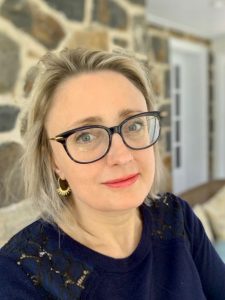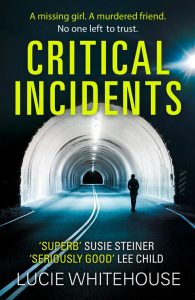Ha, Said Writing
by Lucie Whitehouse
 As the mother of a six-year-old, I spend a fair amount of time these days extolling the virtues of practice (guitar, shoe-lacing) and heartily proclaiming that the more you do a thing, the easier it gets. My daughter is an enthusiastic writer and I’m grateful for many reasons, not least because I don’t think I could look her in the eye and tell her the same about writing. In fact, ever on-brand as one of the most frustrating and contrary ways to spend one’s time, writing is one of the few things for which the opposite seems true.
As the mother of a six-year-old, I spend a fair amount of time these days extolling the virtues of practice (guitar, shoe-lacing) and heartily proclaiming that the more you do a thing, the easier it gets. My daughter is an enthusiastic writer and I’m grateful for many reasons, not least because I don’t think I could look her in the eye and tell her the same about writing. In fact, ever on-brand as one of the most frustrating and contrary ways to spend one’s time, writing is one of the few things for which the opposite seems true.
I’ve always known I wanted to write and at twenty-four, I thought the time had come to stop thinking about it and start doing it. With blithe confidence, a new pad of paper and a bottle of dessert wine, I took myself off to the table in the overgrown ‘garden’ of my house-share and decided I wouldn’t go inside until I had three handwritten pages.
I remember this event with amazement now because when I sat down in our green plastic garden chair, I had absolutely no idea what I would write about. Beyond knowing that the first scene would have a group of friends in a car driving out of London on a night when everyone else was driving in, I was clueless. I poured some wine and looked at the washing on the line. After ten minutes, I wrote a sentence. Two minutes later, I wrote another – and I was away.
What strikes me about this scenario is the sheer blithe confidence – or was it naivety? This is not a sequence of events I would ever repeat now, at least not for a novel. A (short) short story is a different thing – on a rare occasion, a first sentence is like a cork in a bottle from which a story rises genie-like – but for me these days and a lot of other professional writers I know, a novel requires major preparation and, honestly, an increasing amount of nerve.
That first night, though, my aim was not to write a brilliant novel (though by the end, of course, I hoped it would be good) but to see if I could write a novel at all. I’m the first to admit that those three pages were dire, as were the 100 that followed (of these 103, about five sentences made it to the final book). The point was, I was doing it. A later house-mate ran marathons and he compared the two. By his analogy, I wasn’t trying to set any records then, just seeing if I could last the course. (A tip for anyone starting out: don’t throw anything away until you have a hundred pages or more. The evidence that you can do this, you are doing it, they’ll cheer you on.)
When, six years after that night in the garden, I sat down to write book two, I thought I was in better shape: I knew now I could write something novel-length and that it had been good enough for an editor to buy. In fact, that second editor was waiting for this second novel.
Ha, said writing. Because behind my back, it had pulled one of its many protean transformations. My aim now was not just to finish but to finish something very good. To continue the marathon analogy, to get my time down from 17 days, ten hours, nine minutes to something… competitive. This was no longer a lark, a personal challenge, but work.
 More than that, in writing the first book, I’d grown my skill-set. Alternative translation: become crushingly aware of the many, many potential ways there were to fall short or, to continue the marathon metaphor, how many holes there were in the road. (This is also one of the reasons my first book took six years. Every time I finished a draft, I was a better writer than when I’d started it and I had to do another.)
More than that, in writing the first book, I’d grown my skill-set. Alternative translation: become crushingly aware of the many, many potential ways there were to fall short or, to continue the marathon metaphor, how many holes there were in the road. (This is also one of the reasons my first book took six years. Every time I finished a draft, I was a better writer than when I’d started it and I had to do another.)
Each new book finds a way to challenge (torment) the writer. My third novel chose to change its story halfway through the process and I threw away the draft my agent had sold and started from scratch. Four had an unreliable narrator, something I’d never done before. My fifth, Critical Incidents, just out in paperback, is the first in a series and as such had to be a foundation for what I hope will be a trilogy – which means that for book six, which I’m writing now, continuity is an issue and I’m measuring my characters’ arcs over three books. Both Critical Incidents and six are, for the first time, crime novels which meant a deep dive into police work and its details.
And with each book, more experience and a higher technical bar.
The good news, I know now, is that the voice of self-doubt, occasionally even real fear, is what drives progress and improvement. I look back on my twenty-four-year-old self, unarmed with the twenty years experience I now have, with some of the same trepidation I felt when my daughter was learning to walk. Watch out for that hole!
Good writing needs both blithe confidence and the doubting self-critic. You have to write as if no one if watching, edit as if you’re on stage at the National. I have the critic part down so my challenge is recapturing that sense of fearlessness. Or I think this is my challenge. I’m sure book seven will have ideas of its own.
—
CRITICAL INCIDENTS
A missing girl.
A murdered friend.
No one left to trust.
‘Seriously good suspense … trust me, you’ll need to know what happens’ Lee Child
‘Superb characterisation, humour and galloping plot’ Susie Steiner
‘This is that deeply satisfying thing, a strong, deft thriller with real depth’ Tana French
Detective Inspector Robin Lyons is going home.
Dismissed for misconduct from the Met’s Homicide Command after refusing to follow orders, unable to pay her bills (or hold down a relationship), she has no choice but to take her teenage daughter Lennie and move back in with her parents in the city she thought she’d escaped forever at 18.
In Birmingham, sharing a bunkbed with Lennie and navigating the stormy relationship with her mother, Robin works as a benefit-fraud investigator – to the delight of those wanting to see her cut down to size.
Only Corinna, her best friend of 20 years seems happy to have Robin back. But when Corinna’s family is engulfed by violence and her missing husband becomes a murder suspect, Robin can’t bear to stand idly by as the police investigate. Can she trust them to find the truth of what happened? And why does it bother her so much that the officer in charge is her ex-boyfriend – the love of her teenage life?
As Robin launches her own unofficial investigation and realises there may be a link to the disappearance of a young woman, she starts to wonder how well we can really know the people we love – and how far any of us will go to protect our own.
—
Lucie Whitehouse was born in Gloucestershire, England, in 1975. She read Classics at Oxford University and worked in publishing while writing her own first novel, The House at Midnight. She is the author of The Bed I Made, which was a TV Book Club pick; the bestselling Before We Met, a Richard and Judy Summer Book Club pick and ITV Crime Thriller Book Club selection; and Keep You Close. Her new novel, Critical Incidents, is the first in a projected trilogy of literary thrillers featuring DCI Robin Lyons and set in Birmingham, UK. Her books have been translated into thirteen languages. She now lives in Brooklyn, New York, with her husband and daughter.
Follow her on Twitter @LWhitehouse5
Find her on Facebook Lucie-Whitehouse
Category: Contemporary Women Writers, How To and Tips























